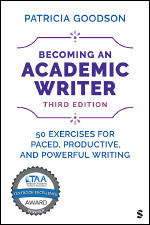Becoming an Academic Writer
50 Exercises for Paced, Productive, and Powerful Writing
- Patricia Goodson - Texas A & M University, USA
"The major strength of this text are the exercises. The exercises are practical, doable, and relevant to the new, developing, and
experienced writer. They make the often overwhelming task of academic writing, palatable and approachable."
"I like the way that it sets up students for success if they are patient enough to read carefully and work through the exercises."
"It has a lot of GREAT writing advice that helps students to break through writing blocks, helps them think through their ideas, and helps
them write about it in a powerful way."
"Students loved it and found it very useful. Everyone I've recommended it to has found it to be useful."
"[This text] encourages the development of identity as a writer and writing as a practice, provides several practical tips and guidance for practices that will develop strengths as a writer, [and] maintains an accessible tone. No one will feel that this book is too lofty for them to use it."
"The strength of this text is the practical exercises."
"The key advice is sound. The collection of other writers' advice is excellent. The author brings together a lot of good advice. I found
myself taking notes from chunks of the book for my lecture discussion."
"It is suitable for a flipped teaching approach, [and emphasizes] internalizing the writing process and developing an identity as a
writer."
"Practical, accessible, useful, empathic"
Relevance to the module descriptors
